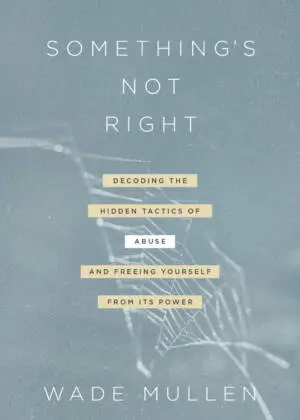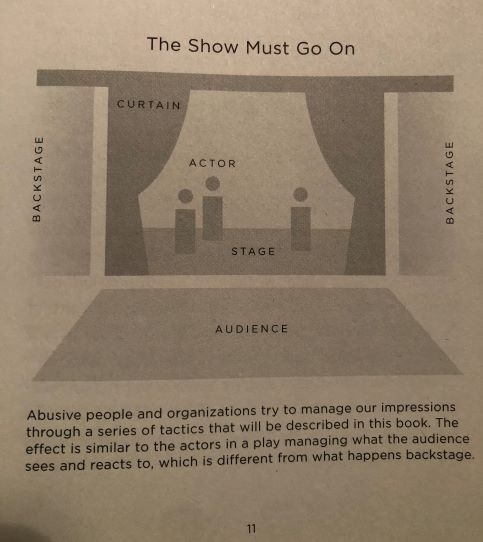In abuse situations, abusers play on loyalty to their advantage. (In my previous blog post on my website, I posted about the problem of divided loyalties.) The hard thing about abuse in the church is that church leaders who are abusive also do good things and genuinely help many people. And not everyone experiences the manipulation, coercion and control. That is very disorienting and people will come to the abuser’s defense because they feel a loyalty to a person that has helped them, taught them, and served them.
I saw this in criminal court the other day when a man who pleaded guilty of sexual assault against a minor had a friend come testify to his good character during his sentencing hearing. The friend basically wanted to state to the judge: “I know him to be a good person!” But what we know personally to be true, that someone is a good person, may not be another person’s reality. A person’s character can be hidden to some… One person sees the good side and abuse can be the experience of others.
When it comes to abuse, we must not trust our own judgment too strongly and we must come to recognize our biases. It’s hard for people to overcome their bias and over come the narrative that they have been led to believe. It is imperative that we take seriously the voice of those claiming to be spiritually abused.
Dr. Michael Kruger in Bully Pulpit explains that “Spiritual abuse is when a spiritual leader—such as a pastor, elder, or head of a Christian organization—wields his position of spiritual authority in such a way that he manipulates, domineers, bullies, and intimidates those under him as a means of maintaining his own power and control, even if he is convinced he is seeking biblical and kingdom-related goals.” – (Kruger, p.24)
In Wade Mullen’s Book, Something is Not Right: Decoding the Hidden Tactics of Abuse and Freeing Yourself From Its Power, he talks about how impression management is a tool of abusers who use their power for their own gain. Abuse almost always comes in a system that prevents it from being dealt with, especially where the abuser is in what Mullen describes as a “keystone” role, where a key personality holds the community together.
Mullen asks us to consider a play, where there is a stage. What happens backstage is very different from what we see from the audience. “The actor strives to give the audience what they want, knowing that his relationship with the audience depends on it-that is the only way that the show can continue. The audience reacts, and the actor adjusts his performance based on those reactions to keep the audience engaged.”–(Mullen, p.11) “The chief desire of abusive individuals and organizations is to attain or retain power-most often the kind of power gained and held firm through deception.” (p.15)
“It’s information control.”- (p.16)
The abuser knows how to perform and what message he should deliver to his crowd.
Secondary actors play their role. In a “reconciliation” play, they will give confessions (I should say concessions), shake hands and give forced hugs, playing their part in the play. Actors make sure others follow the script. If it is not in the script, it can not be allowed. The tool of the microphone is used to silence victims. In churches, scripts featuring reconciliation are catchy. These are concepts that attendees of churches like to hear. It can get emotionally captivating. The problem is, the narrative is controlled by the performers on the stage.
Whoever thought a show could be made of repentance and forgiveness? Never mind that reconciliation and repentance can’t be forced.
But here’s what to look out for. In Wade Mullen’s book, he talks about how “Those who are governed by integrity will do whatever it takes to establish the truth and correct wrongs, even if it means giving up their power. Those governed by power will do only what is necessary to prevent or quell scandal so as to not risk losing that power. They are crisis managers, first and foremost, not truth seekers…. Truth must always precede confession, and an apology offered without a full acknowledgment of the truth is more likely a concession–a tactic designed to disarm a threat.” (p.127)
It’s crisis management. In the church context, you can even see the weaponization of communion and weaponization of peacemaking and reconciliation as tools of manipulation and harm for an abuser’s agenda. Church discipline is also a weapon. It is unity and peace at all costs. Let us sing hymns about unity. Let us preach on unity from the pulpit and proclaim the budget a third level issue that we should submit to our elders on. Let’s make little of the issue and conflict and minimize or conceal the sin. And then let’s come to the Lord’s table!
No. Christian unity is a by-product of maturity, it can’t be forced. In Christian love and unity, there is no fear. Unity does not require uniformity of opinion.
In spiritual abuse, calls to submission, calls to follow Matthew 18, calls to not gossip, calls to unity become tools to isolate victims, deflect bad attention, manipulate others, and intimidate those that would speak up. Peacemaking becomes a weapon.
Wade Mullen recounts how Matthew 18 was used against him as a crisis management tool to silence him. It is a passage I love as a peacemaker, but the abuse of this passage is documented here. Abusers use Matthew 18 as a tool of isolation. Isolated victims are the easiest to control. And no, it is not gossip to speak to a friend about legitimate concerns about church and to process what you are experiencing.
How sickening it would be to profane the Lord’s table as a weapon of abuse. Righteous, self-controlled, and bold anger should be our response.
In his chapter on “Concessions,” Mullen says, “My experience and research have shown me that concessions, while offered as a bridge of reconciliation, are often surrounded by other messages that serve a very different purpose. This bridge of reconciliation is surrounded by barriers of defense and self-promotion-and more than anything, the bridge is used as a means of avoiding the murky waters of shame. Abusers and abusive organizations may concede the basic reality of the wrong-“Yes, this happened”-but quickly add statements that either soften their responsibility or promote their integrity….The problem with that, of course, is that the shame then remains squarely on the shoulders of victims. It has to go somewhere.”-p.129.
Run to victims and support them. Listen to their stories. Discern truth. But don’t ask them about the truth unless you want to reconsider that you believed a false narrative.
Concessions that are self promotions can look like this: We are growing and going through growing pains! Look what God is doing. Come join and recommit to our vision. We are adding new processes.
These are concessions asking us to recommit to the system. If we recommit to an abusive system, we strengthen the strength of the abuser.
Concessions also put the blame on victims. “We will better control the floor next time so you don’t hear from angry hurting people. It was our fault for not cutting Scott off.”
And we will do better to control the process next time. Let’s also blur the issues and throw in some sin-leveling and deflection to others. Let’s throw in other people’s sins too so our sin doesn’t look so bad. We are all sinners. Let’s throw in more confusion so Parker, Scott, and John confess their sins at the same time. This is a sort of sin leveling which brings less shame to the abuser.
Even in the “more honest” but incomplete concessions, the organization self-promotes. “We will fix this.” Hang in with us. Recommit to the system. There will be concessions that ask for sympathy. “I don’t like how intense I am. I had to be intense to get through grad school and my mentor was even more intense.”
Sometimes a concession has to get real honest when it’s plain to everyone. Perhaps everyone sees that a leader has disqualified himself. An abuser may even say, my behavior was unbefitting of an elder according to scripture, but let me look you in the eye and say, “Please forgive me.” Let me off the hook. Submit to me anyway.
But as many of us have been taught, forgiveness doesn’t mean there are no consequences and trust has been broken. We should not forgive someone who is not repentant, but instead call them to repentance out of love.
Demonstrations
In another chapter of Mullen’s book, he talks about demonstrations. “When organizations devote greater urgency to demonstrating change than to pursuing an understanding of the problems, they sacrifice truth. And this has serious consequences. At best, this allows blind spots in the organization to remain. At worst, the ‘change’ is a form of stage craft used to maintain favor with an audience. To borrow a biblical phrase, the community claims, “Peace!” when there is no peace. They desire to be seen as good without having to meet the demands of goodness. They want to be granted trust without having to earn it. They want to be seen as agents of healing without repairing any wounds. They want to collect a following without stopping to serve those they’ve trampled over.”-p.155-156
Will we turn a blind eye and let the show continue on until more are hurt? You can also see the fruit of spiritual abuse in the damage it leaves behind. How many people have been wounded and terrified, have questioned their faith, and even abandoned their faith or pushed to feel guilt or shame where they shouldn’t? I believe the damage done by spiritual abuse should be taken as seriously as sexual or physical abuse.
Where do we go from here? Leaders who abuse their power are illegitimate authorities, which is not an authority at all. Actors must not follow the script and must go against the narrative. “Abuse is contrary to Scripture and disqualifying for ministry.” (Kruger, p.130.)
We must obey God rather than man. Proverbs 29:25: “The fear of man lays a snare, but whoever trusts in the Lord is safe.”
Mullen says: “Knowing that the abusive person or organization wants to control your perception of them, it can be helpful to ask yourself, “What does the abuser want me to do? Whenever you begin to feel manipulated. Once you’ve identified that and it’s not always clear, then the next question is, “What would be the opposite action? If the answer to that question is clear, and the action is feasible and ethical, then one way you can resist an abuser’s manipulation is to do the opposite of what they’re telling you to do. That is the process of reframing, of using your agency to regain control of the situation.” (p.174.)
Be blessed my friends. The Lord is a good shepherd who lays down his life for his sheep. Be bold, be courageous. The Lord is on your side. He will fight your battles. (See Ezekiel 34:1-31 and John 10:10-13.)








